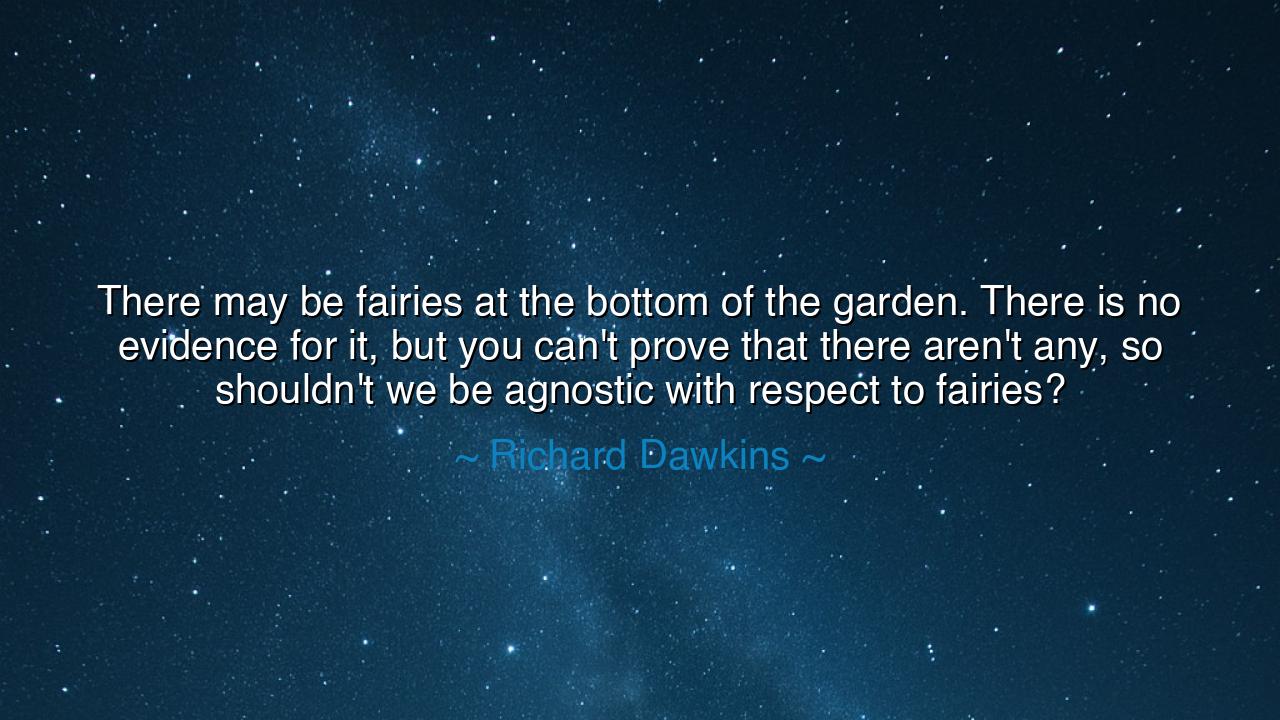
There may be fairies at the bottom of the garden. There is no
There may be fairies at the bottom of the garden. There is no evidence for it, but you can't prove that there aren't any, so shouldn't we be agnostic with respect to fairies?






"There may be fairies at the bottom of the garden. There is no evidence for it, but you can't prove that there aren't any, so shouldn't we be agnostic with respect to fairies?" In these words, Richard Dawkins invites us into a philosophical reflection on agnosticism, belief, and the nature of evidence. Dawkins, a staunch advocate for scientific thinking and rationality, uses the example of fairies to illustrate a key point: just because something cannot be disproven does not make it rational to believe in it. The very nature of human inquiry demands that we seek evidence, and without it, our belief in something must remain tentative—agnostic at best. However, the agnostic stance here is not merely about uncertainty but about understanding that belief without evidence is not a worthy foundation for knowledge.
In ancient times, philosophers like Socrates and Aristotle grappled with similar questions regarding the nature of truth, knowledge, and belief. Socrates famously declared that the only thing he knew for sure was that he knew nothing, a declaration of humility in the face of an ever-expanding world of knowledge. He understood that belief must be grounded in evidence and reason, and he warned against accepting unfounded ideas. His approach was one of rigorous questioning—he sought to separate truth from opinion and to engage in dialogue that would lead to clarity and understanding. In this way, Socrates would agree with Dawkins: that without evidence, belief in things like fairies, or gods, or myths, is unwise and unproductive.
Aristotle, in his works, too emphasized the importance of evidence and reason in understanding the world. His philosophy, though not devoid of its own metaphysical elements, centered on the idea that true knowledge must be based on observation and logical reasoning. To Aristotle, the world could be understood through the application of the scientific method, or at least through a method of logical inquiry that sought to explain the phenomena around us. Just as Dawkins suggests that belief in fairies requires no more than a logical deduction from lack of evidence, Aristotle would argue that any claim—whether about fairies or the heavens—must be tested against the known and observable world.
But it is not only the ancient philosophers who have debated the place of agnosticism in human life. The Enlightenment thinkers, such as Voltaire and David Hume, pushed the boundaries of skepticism and agnosticism even further, asking not only whether gods and fairies existed, but whether we could ever truly know anything beyond our own experience. Hume, in his work An Enquiry Concerning Human Understanding, famously questioned the very nature of cause and effect, arguing that all of our knowledge is based on habit and experience, rather than definitive proof. For Hume, the inability to prove something was grounds enough to be skeptical of its truth. Dawkins, in a more modern context, extends this skepticism to the supernatural, emphasizing that lack of evidence is a compelling reason to remain agnostic on issues that cannot be verified.
The heart of Dawkins' argument lies not just in dismissing belief in fairies, but in advocating for a world where ideas are rooted in evidence and reason. When we live in an age where science has given us unparalleled understanding of the world, from the laws of physics to the intricacies of genetics, it is more important than ever to approach knowledge with a skeptical eye, to question what we cannot prove, and to doubt what lacks proof. Agnosticism, as Dawkins suggests, is not about dismissal of possibilities but about acknowledging that without evidence, there is no justification for belief. It is the humble recognition that, like Socrates, we must admit the limits of our knowledge.
The lesson here is clear: in all things, whether the existence of fairies or the nature of gods, we must cultivate a mindset of inquiry and evidence. As we navigate the vast sea of ideas, we should do so with both curiosity and skepticism, ever willing to explore, but always requiring proof before committing to belief. The wise approach to life is one that balances open-mindedness with critical thinking, recognizing that while we may never know everything, we must remain vigilant in searching for the truth through rational inquiry and evidence.
In our own lives, let us embrace agnosticism in its true sense—not as a rejection of all possibilities but as a commitment to seek truth with integrity and humility. When faced with grand claims or alluring ideas, let us ask ourselves: what evidence do we have to support this belief? By grounding our beliefs in facts and reason, we not only grow wiser but also contribute to a society that values rationality and intellectual honesty. In doing so, we honor the legacy of great thinkers like Socrates, Aristotle, Hume, and Dawkins, who taught us that true wisdom lies not in certainty, but in the courage to question and the humility to acknowledge the limits of our knowledge.






AAdministratorAdministrator
Welcome, honored guests. Please leave a comment, we will respond soon